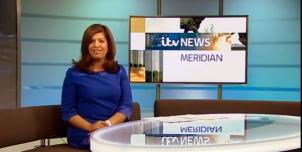Full Freeview on the Oxford (Oxfordshire, England) transmitter
| Google Streetview | Google map | Bing map | Google Earth | 51.790,-1.179 or 51°47'25"N 1°10'46"W | OX3 9SS |
The symbol shows the location of the Oxford (Oxfordshire, England) transmitter which serves 410,000 homes. The bright green areas shown where the signal from this transmitter is strong, dark green areas are poorer signals. Those parts shown in yellow may have interference on the same frequency from other masts.
This transmitter has no current reported problems
The BBC and Digital UK report there are no faults or engineering work on the Oxford (Oxfordshire, England) transmitter._______
Digital television services are broadcast on a multiplexes (or Mux) where many stations occupy a single broadcast frequency, as shown below.
64QAM 8K 3/4 27.1Mb/s DVB-T MPEG2
DTG-12 QSPK 8K 3/4 8.0Mb/s DVB-T MPEG2
H/V: aerial position (horizontal or vertical)
Which Freeview channels does the Oxford transmitter broadcast?
If you have any kind of Freeview fault, follow this Freeview reset procedure first.Digital television services are broadcast on a multiplexes (or Mux) where many stations occupy a single broadcast frequency, as shown below.
64QAM 8K 3/4 27.1Mb/s DVB-T MPEG2
DTG-12 QSPK 8K 3/4 8.0Mb/s DVB-T MPEG2
H/V: aerial position (horizontal or vertical)
Which BBC and ITV regional news can I watch from the Oxford transmitter?

BBC South (Oxford) Today 0.4m homes 1.6%
from Oxford OX2 7DW, 6km west-southwest (258°)
to BBC South (Oxford) region - 6 masts.
BBC South (Oxford) Today shares 50% content with Southampton service

ITV Meridian News 0.9m homes 3.4%
from Whiteley PO15 7AD, 102km south (182°)
to ITV Meridian/Central (Thames Valley) region - 15 masts.
Thames Valley opt-out from Meridian (South). All of lunch, weekend and 50% evening news is shared with all of Meridian+Oxford
How will the Oxford (Oxfordshire, England) transmission frequencies change over time?
| 1950s-80s | 1984-97 | 1997-98 | 1998-2011 | 2011-13 | 2013-18 | 2013-17 | 23 May 2018 | ||
| VHF | C/D E | C/D E | C/D E | C/D E | C/D E T | W T | W T | ||
| C2 | BBCtvwaves | ||||||||
| C29 | SDN | ||||||||
| C31 | com7 | com7 | |||||||
| C37 | com8 | com8 | |||||||
| C41 | BBCA | ||||||||
| C44 | D3+4 | ||||||||
| C46 | _local | ||||||||
| C47 | BBCB | ||||||||
| C49tv_off | C5waves | C5waves | |||||||
| C50tv_off | SDN | SDN | |||||||
| C51tv_off | LOX | LOX | |||||||
| C53tv_off | C4waves | C4waves | C4waves | +BBCA | +BBCA | +BBCA | |||
| C55tv_off | ArqB | ArqB | ArqB | com7tv_off | |||||
| C56tv_off | COM8tv_off | ||||||||
| C57tv_off | BBC1waves | BBC1waves | BBC1waves | BBCB | BBCB | BBCB | |||
| C59tv_off | -ArqA | -ArqA | -ArqA | ||||||
| C60tv_off | ITVwaves | ITVwaves | ITVwaves | -D3+4 | -D3+4 | -D3+4 | |||
| C62 | SDN | ||||||||
| C63 | BBC2waves | BBC2waves | BBC2waves |
tv_off Being removed from Freeview (for 5G use) after November 2020 / June 2022 - more
Table shows multiplexes names see this article;
green background for transmission frequencies
Notes: + and - denote 166kHz offset; aerial group are shown as A B C/D E K W T
waves denotes analogue; digital switchover was 14 Sep 11 and 28 Sep 11.
How do the old analogue and currrent digital signal levels compare?
| Analogue 1-4 | 500kW | |
| BBCA, D3+4, BBCB | (-7dB) 100kW | |
| SDN, ARQA, ARQB | (-10dB) 50kW | |
| Analogue 5 | (-11dB) 40kW | |
| com8 | (-14.7dB) 17.1kW | |
| com7 | (-14.8dB) 16.4kW | |
| Mux 1*, Mux 2*, LOX | (-17dB) 10kW | |
| Mux C*, Mux D* | (-18dB) 8kW | |
| Mux A*, Mux B* | (-19.2dB) 6kW |
Which companies have run the Channel 3 services in the Oxford transmitter area
|
|
Saturday, 1 October 2011
P
Peter Turner2:03 PM
NN13 postcode, BBC1/2/3/4 have too strong a signal, so installed an attenuator, if I turn down the signal to resolve the above I lose all other channels.
Why would the signal stregnth on channel 53+ be more than on channel 60-?
What do the + and - signs after the channel numbers mean?
My freeview recorder is a Technika AEDTR160S7.
| link to this comment |
S
Steve P2:22 PM
PT - I'll give you a quick answer but hope someone more expert will follow!
Assuming the 53+ and 60- are the same power it might be that your aerial works better for one than for another - especially one like 60 at the end of the range in use.
IIUC the + and - mreans they are using slightly different frequency to the "standard" for that number. I think I've seen a suggestion that some boxes don't work well with -s.
| link to this comment |
M
mst2:55 PM
Oxford
@Peter
I see the same wrt to C53 and C60 with a wideband log-periodic which should work from C21 to C68! Need 6dB attenuator to get 53 off 100% and that hurts the quality on others. It is hard believe they are both at same power at same height on the mast. BUT I'm not too sure what my boxes actually report for signal strength. It may actually be an analogue SNR (quality being a digital Error rate), so the problem may be noise on C60 from a distant Tx, Salisbury perhaps? Precise alignment of aerial may help.
| link to this comment |
mst's: mapM's Freeview map terrainM's terrain plot wavesM's frequency data M's Freeview Detailed Coverage
C
Chris.SE3:22 PM
Pete Turner: Hi, most of your question has been answered by Steve P. & mst. Aerial postion can make a difference, as can the +/- shift off the centre frequency, this being receiver dependant - not aware of any specific issues with your PVR, it's a Vestel clone - you can always google, but there's lots to read!
If there is a significant difference between C53 and C60 it could indicate degraded aerial (if old - water getting into connector box could cause this) likewise degraded (or cheap) coax or maybe aerial is a group B instead of C/D. However if you are going to replace your aerial in the future you should go for a wideband to cope with projected new COM muxes 7,8,9 sometime after ~2013.
| link to this comment |
M
martin9:52 PM
before upgrades could recieve all channels inculding sky which was being feed from unit down stairs now this is snowy and retune carnt clear also signal strength has drop on free view so either not getting picture or channel freezes on certain stations
| link to this comment |
S
Steve P11:45 PM
If Sky is from a RF output, probably one of the new broadcast channels is interfering and you will have to change its frequency.
Otherwise, no postcode, no can help.
| link to this comment |
Sunday, 2 October 2011
N
Nick Wilcock9:01 AM
Witney
Channels 55, 59 and 62 were unused in analogue days from Oxford, so if your Sky system used one of those channels for your RF feed, you will need to retune your Sky receiver output channel.
Go to 'Services' on the handset, then press 4 then 0 then 1, then press 'select' to view the installation menu. Choose option 4 (RF outlets), then choose the channel to which you wish to retune. Then scroll down to 'save new settings'.
I use Ch 22 for Sky, Ch 25 for VCR and Ch 28 for DVR - all work fine.
| link to this comment |
Nick's: mapN's Freeview map terrainN's terrain plot wavesN's frequency data N's Freeview Detailed Coverage
S
Steve P1:41 PM
Wrexham
If you plug in your postcode top right this site suggests spare channels.
| link to this comment |
Steve's: mapS's Freeview map terrainS's terrain plot wavesS's frequency data S's Freeview Detailed Coverage
B
Bill C3:52 PM
Oxford
We are in Oxford city, a few miles from the Beckley transmitter. Before switchover we had pefect Freeview on all channels. After switchover, despite all recommended retuning etc, we have rapidly varying signal strength (from poor to excellent and back in the space of a few seconds) on UFH channel 60 which is delivering the ITV channels.
One Old but reliable analog TV, oldish freeview box (digihome dvb915), professional installed normal roof aerial, no signal boosters etc. Any thoughts ...?
many thanks
Bill
| link to this comment |
Bill's: mapB's Freeview map terrainB's terrain plot wavesB's frequency data B's Freeview Detailed Coverage
S
Steve P4:34 PM
UK digital TV reception predictor
Bill - you have a VERY strong signal - maybe too strong even without amplification.
Do any of your sets have built-in aerials? Try that, or just a wire into the coax plug.
Or buy an attenuator
Amazon.co.uk: Low Prices in Electronics, Books, Sports Equipment & more (LL145HD)
| link to this comment |
Select more comments
Your comment please!





